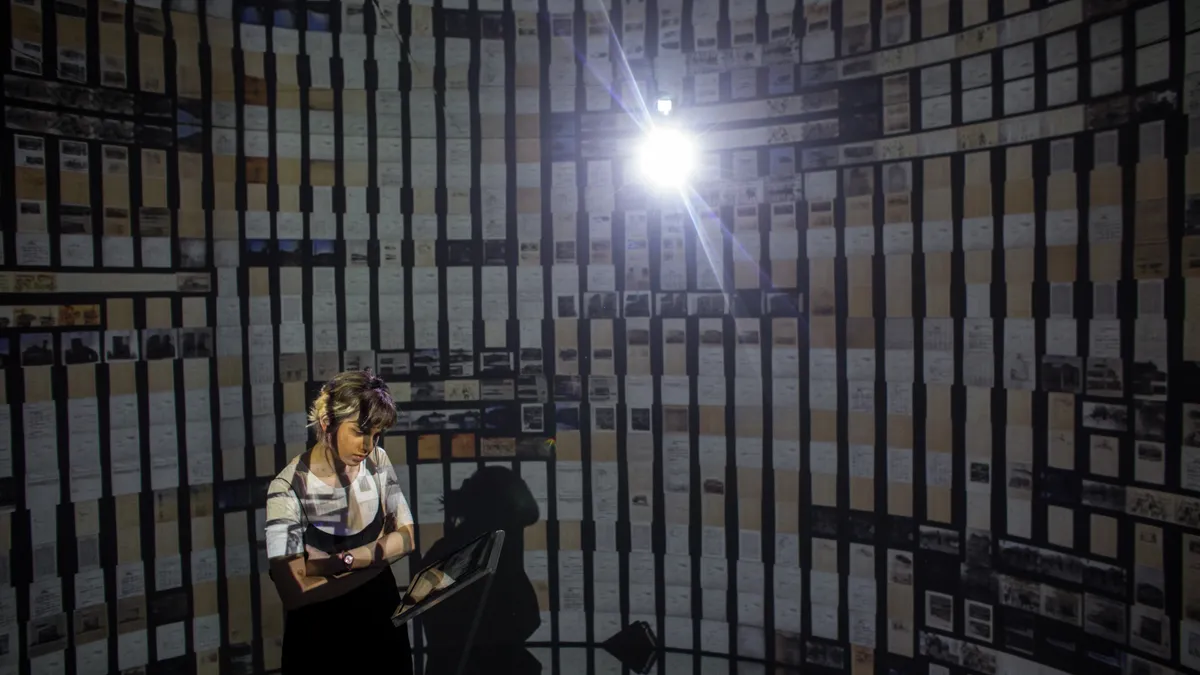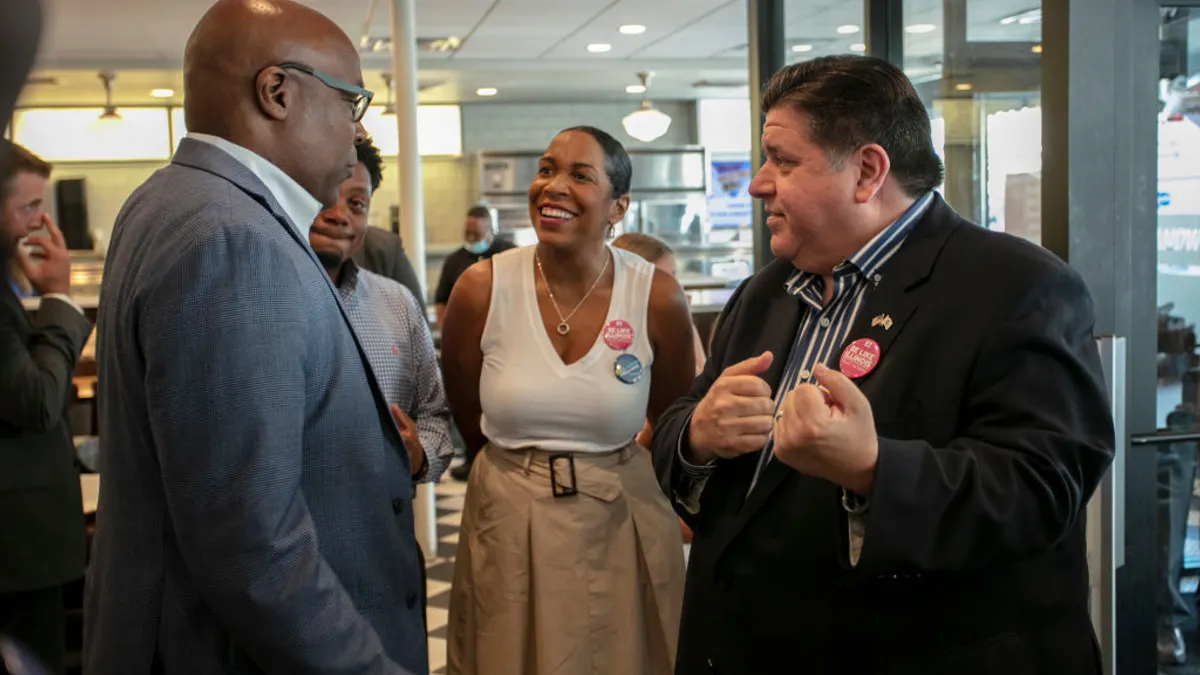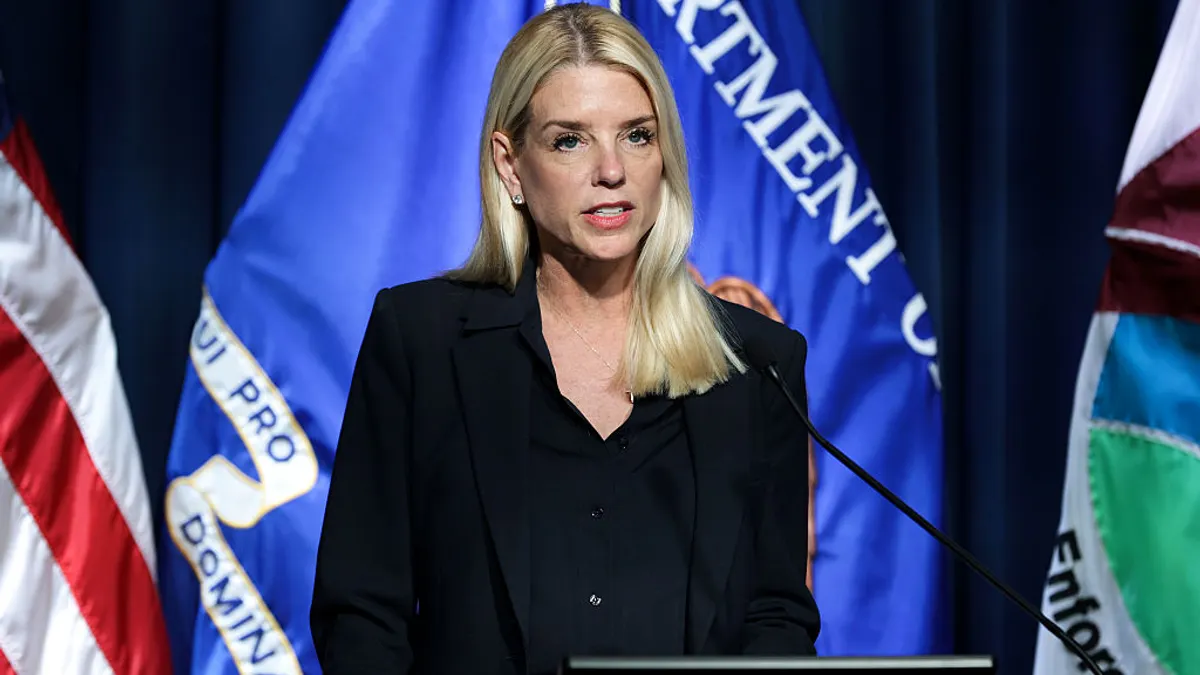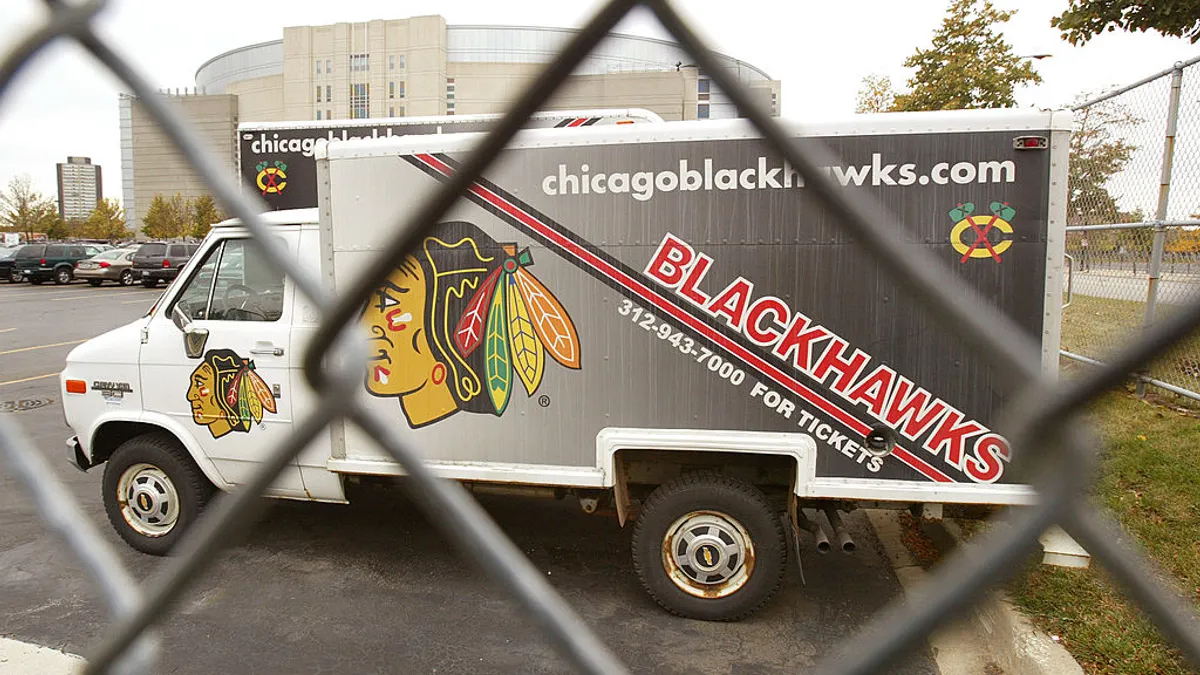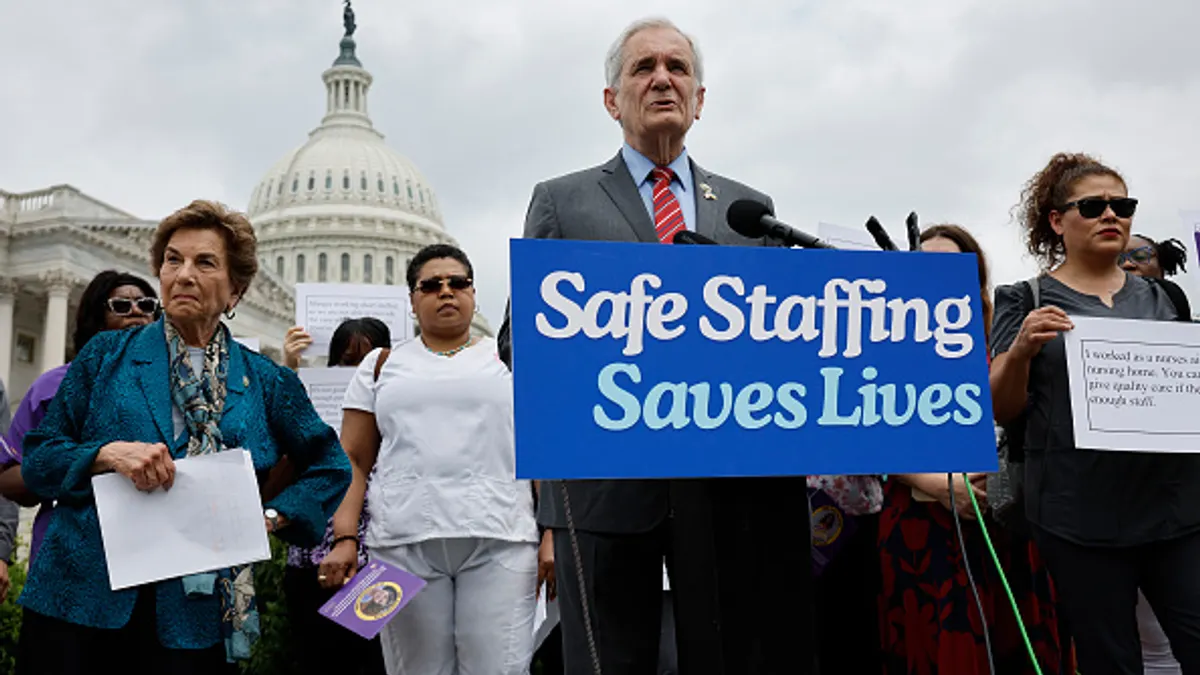It's not a stretch to say, "True Religion is iconic." Marketing strategist and culture commentator Karen Civil once called True Religion "one of the original streetwear brands." The minimalist tees emblazoned with Buddha and ripped jeans, with a rock 'n' roll je ne sais quoi, are instantly recognizable to 2000s style geeks.
Despite having the co-sign of Kanye West, Nicki Minaj, and the like, True Religion filed for Chapter 11 bankruptcy in 2017. At the time, the brand's decline had been chalked up to the online shopping boom. And then True Religion filed for a second Chapter 11 bankruptcy in April 2020, amid the pandemic-era rent woes and department store shut-downs.
Theresa Watts stepped into her role as True Religion's vice president of human resources in June 2020, on the heels of two bankruptcies, the global persistence of a deadly virus, and a modern-day civil rights movement. The brand's hiring team warned her, Watts said to HR Dive, but she took it in stride.
"'They told me, 'Theresa, are you sure? Do you want to do this? And I said, 'I can do it. I can put on my steel-toed boots. I can come in and kick butt with everybody else,'" she said. Below is a conversation with Watts about her gusto as an HR professional, and how it served her in the reconciliation between jilted employees and True Religion's leadership.
Editor's note: this conversation has been edited for clarity and brevity.
HR Dive: Earlier in our conversation, you mentioned making sure everyone feels like a family as they're working in the business. I started covering HR in the pandemic and something that I really have seen a lot is that people are really holding space for their co-workers as human beings — not just co-workers. What are some ways HR professionals can ensure their employees feel like they're being seen, and that space is being held for them as human beings?
THERESA WATTS: It's including them on decisions — being completely honest and transparent. A lot of times, decisions are made behind closed doors and on private conference calls. And if you're really my friend, if you're really my family, if you're really important to building this business — then I care about your opinion. And I want you to know why decisions are made.
Growing up, my mom would say, 'Theresa, listen: this is the money that we have. And so, you can either get new shoes or we can get food. You can go to the movies with your friends or we can get food. And so this is why I made that decision.'
We do that at True as well. As in, 'Listen, guys. Yes, we have successfully emerged from bankruptcy. That doesn't mean that we don't still need to be careful — that we need to look out for you and look out for the business, to make sure that we don't go into another one.' For example, last year, the decision was, 'We can either have this big Holiday Spectacular, or we can have employee bonuses.' So of course, they picked employee bonuses. Including them in that decision process made people feel whole.
That makes sense — just ensuring everyone feels like their voices are being heard and represented. You mentioned the bankruptcy aspect. I know that you joined in June 2020. What has the atmosphere and the climate at True Religion been like? What kinds of issues are you helping folks with, especially because I imagine there are people who have been working at True Religion throughout the whole bankruptcy process?
It's building the trust back up, because that's what we lost. Employees don't trust anymore that they're going to have a job tomorrow, that we're not going to go into another bankruptcy.
Once you've lost it, it's really hard to gain back. But you know, there are some employees who've been with us for 13 or so years. So it's tapping into them and saying, 'Why did you stay? Why are you still here?' It's learning from their experiences and getting them to share with the employees, who may have not been here for 13 years, who are nervous.
It's talking with the senior leadership team about how to speak with their direct reports, about how [the direct reports] fit in and how their contributions help us to be better. And also, just saying, 'Listen, we're not perfect. organizations are run by humans. You know, so we make mistakes. If we weren't human and didn't make mistakes, we would not have gone to bankruptcy. It's just a fact.'
Telling employees, 'This is what we're doing now. These are the mistakes that we made. This is how we're veering away from the mistakes.' Being a little bit humble helps to build trust. And that is something that we completely lost. I think that we're gaining it back — I think we are.
I think we are, just from seeing the excitement in the office. People call me directly on my cell phone, saying they appreciate some of the great gains that we've made, or some of the great things that we're doing. Or people stopping me in the hallway saying, 'You know, thank you,' or 'I can't believe we did this!'
It's those types of things. You're comfortable coming to me — and any member of the senior leadership team — expressing your feelings.
On that positive note, can you talk about what at True Religion you've been excited by and some of the feedback you've received on it?
For the first time in True Religion history, we celebrated Juneteenth. We actually made it a corporate holiday this year and ongoing. But we were nervous. We were walking into a space with fear, because we never celebrated this before. It has never been a big focus before.
Would employees be receptive? Would employees think: 'Oh, they're just doing this to save face, because of everything that's going on,' or, 'Yeah we got that day off, but what does that mean for the rest of the year?'
I first talked to the SLT speaking to the organization about what Juneteenth means — not just the historical perspective, but also what it means today amid the societal upheavals that we're facing. It was teaching the SLT to fearlessly talk about what that meant.
You have to be able to say that Juneteenth is a celebration of the ending of Black slavery. It is important today because our Black and brown people in society are being treated savagely and treated horrendously, in the public eye. We wanted our employees to know that we see that.
We didn't just give them the day off. [Up until Juneteenth,] we educated them on the history and how not recognizing the hurt that Black and brown people face regularly impacts our employees and our customers. We made a statement [to both].
I almost get emotional, because two employees came into the office with tears in their eyes. They were just so excited. 'Theresa you got us Juneteenth off.' No, you know, Michael Buckley, our CEO was receptive to it. It would not have happened if he were not receptive to this. And it would not have happened if we didn't spend time on our SLT call talking about the importance of Juneteenth, so that we could communicate it to the entire organization.
And it just takes one person to be excited and go spread it. I had those two employees go out and talk about it on the floor. So everyone was excited about it. Black, Hispanic, Asian, it didn't matter. They were excited that we'd be doing this.
The next time another segment of our employee population is impacted by something that's going on in the world, they know that we're going to stick up for them. They know we're gonna challenge it and they know that we're going to be their champions.
That's really poignant, especially since, even just culturally speaking, True Religion means a lot to the Black community. And it's noteworthy that you're able to take a stand in an authentic way, and even have that extend beyond the Black employees.
Because you started in June 2020, I'm sure it was a tumultuous time with a lot of transitions and conversations happening at once. Can you talk about what your first month was like at True Religion?
Oh, it was a breeze. It was a piece of cake.
No, I'm just teasing.
"'They told me, 'Theresa, are you sure? Do you want to do this? And I said, 'I can do it. I can put on my steel-toed boots. I can come in and kick butt with everybody else,'"
I was just talking to Michael Buckley about the type of people we hire. We do need tough, scrappy people who want to come in and fight. When we're interviewing people, that's what we tell them. 'Listen guys, we're a scrappy organization. We're basically a startup and we fight for our position in the industry.'
So that was what it was. It was picking people up by their chin, looking them in the face and saying, 'I'm sorry that this happened to you. I'm sorry that you're no longer working with someone you consider to be your best friend at work, because they didn't return after the furlough. I'm sorry that you sat at home for all those months, worried, not knowing what was going on.
'And I'm so sorry that we're back now, a smaller organization. We don't have the resources that we had before. We moved to a smaller building, and just about everything is different. I'm sorry for that, but we are hurting. We're hurting with you. How can we come together as an organization, as a family?'
There was no time for false pretenses. I had to be me from the Southside of Chicago, and say 'Listen, come in, this is what needs to be done. I'm a fighter. Are you a fighter? OK, join my team.' 'Are you a fighter? OK, join my team.' 'You're not a fighter? OK, let's toughen you up because we want you, we want what you got. We want your skill set, and we're not going to lose you.'"









